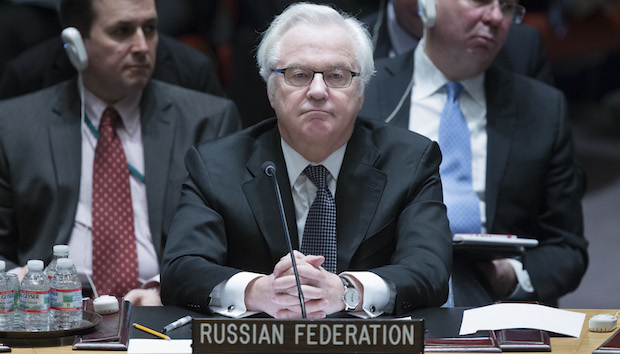
Russia’s UN Ambassador, Vitaly Churkin, listens during a UN Security Council meeting on the Ukraine crisis, in this March 15, 2014, file photo. (AP Photo/John Minchillo)
United Nations, AP—The UN Security Council on Friday for the 13th time failed to take action on the growing crisis in Ukraine, with Russian ambassador Vitaly Churkin demanding a “swift halt of all violence” and Western powers scoffing at his country’s indignation.
Council members accused Russia of equipping and funding the pro-Russia forces that have seized government buildings in 10 eastern cities. Ukraine on Friday launched its first major offensive against the insurgency.
“Russia … has released bands of thugs on Ukraine … and is suddenly discovering this mixture might escape its control,” French ambassador Gerard Araud said.
Russia called this latest council meeting, the second in a week. Churkin called on Kiev and its Western “enablers … to not commit a fatal error” and stop the offensive, which he described as “criminal misadventures.” He again called Ukraine’s interim government illegitimate.
But British Ambassador Mark Lyall Grant retorted that “Russia’s synthetic indignation convinces no one,” and US Ambassador Samantha Power said Russia was “trying to insult the intelligence of the world community” by calling another urgent council meeting.
The council so far has been unable to agree on any action on Ukraine, as Russia holds veto power as a permanent council member. The 193-nation General Assembly weeks ago affirmed Ukraine’s territorial integrity in a surprisingly strong but nonbinding vote, showing Russia’s isolated stance.
Frustration soared Friday, and Araud despaired at the council’s “impotence.”
“Peaceful protesters do not use grenade launchers,” Lithuania’s ambassador, Raimonda Murmokaite, said tartly. “They do not kidnap and shamelessly parade international observers.”
Earlier Friday, pro-Russia forces shot down two Ukrainian helicopters. And seven European observers from the Organization for Security and Cooperation in Europe remain held by pro-Russia gunmen.
Ukraine has reported “many” rebels dead and wounded in its first major offensive against the insurgency. The Kremlin said Kiev’s military move has “destroyed” the two-week-old Geneva agreement on calming the crisis.
Ukraine’s deputy ambassador to the UN, Oleksandr Pavlichenko, told the council that his country rejects all attempts by Russia to blame it for not upholding the Geneva agreement, and he dismissed as “false” Russian claims that some members of Ukraine’s new military operation spoke English.
The council’s president this month, South Korean ambassador Oh Joon, asked at the end of the meeting whether Russia was proposing some kind of council statement calling for an end to the violence. Churkin said “it would be good … to make a statement all together.”
After the meeting, the British ambassador told reporters that any draft statement Russia might circulate would have to both “unequivocably condemn” the violence and reinforce the commitments of the Geneva agreement.
“It may well be that we’ll be back in the Security Council before too long,” Lyall Grant said.
In Washington, President Barack Obama and German Chancellor Angela Merkel threatened tougher new sanctions against Russia if Moscow doesn’t quickly change its disruptive behavior.
UN Secretary-General Ban Ki-moon issued a statement through his spokesman expressing “grave concern” and urging both a diplomatic solution and a release of the OSCE monitors.
UN political chief Jeffrey Feltman will visit Kiev and Moscow next week to urge “restraint and an immediate return to dialogue.”
